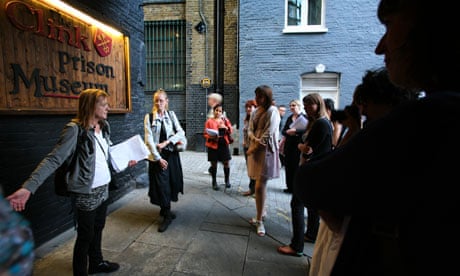On a squally August evening near London Bridge two tour guides are taking a group of tourists on an unconventional walking tour of the capital. The pair have long and chaotic histories of homelessness, so in addition to the usual tourist attractions, they share with their audience glimpses of their street life.
"I slept under that bridge for six months," says Viv Askeland, 54, pointing down the river Thames to Blackfriars Bridge. Fellow tour guide, Hazel Wilding, 52, adds: "When I slept on my own, I made sure there were cameras around me."
The women are part of the workforce of Unseen Tours, a pilot scheme helping homeless people to find sustainable work as tour guides on the streets they once lived on. Part of the London fringe festival this month, Askeland and Wilding, along with two homeless men in east London, have been hosting walking tours five days a week.
Wilding pauses outside the Clink museum, built on the site of a notorious medieval prison, in a narrow cobbled street. "This really upsets me," she says, before telling the 30-strong crowd about the so-called Winchester geese – prostitutes regulated within the area's brothels by the Bishop of Winchester, who owned the Clink.
Pimps without Cadillacs
"[The bishops] were like the pimps without the pink Cadillacs," says Wilding. "The bishop was like an inspector," adds Askeland. "He taxed them all."
The tour concludes at the centuries old Cross Bones graveyard, unconsecrated ground for Bankside's prostitutes and now a disused carpark. The gates have been threaded with ribbons, mandalas, trinkets and jewellery. "This is where the Winchester geese got buried," says Wilding. "It's for the outcast dead."
The idea for Unseen Tours came from a grassroots volunteer network, the Sock Mob, so called because it regularly distribute socks and food to London's homeless people. Co-organiser Lidija Mavra set it up seven years ago with friends. "We spontaneously used to send an email out once in a while and say let's go out on to the streets and hear [homeless people's] stories because they're lonely and isolated. The socks were a way of breaking the ice," she says.
Having expanded the network to around 400 volunteers over the internet, the organisers launched Unseen Tours as a social enterprise, Sock Mob Events. In February, they received £4,000 funding from UnLtd, a charity that supports social entrepreneurs.
The point of the tours, says Mavra, is to, "present [homeless people] in a very different light so that people can see them as having something to offer. We tend to have this very doom and gloom version of homeless people". The tours are intended to give homeless people a little more "ownership" of their lives, she says.
"It's the most logical thing. [The homeless guides] know their streets and they're great communicators," she says.
The guides work for themselves, keeping the majority of the £5 per person cost of the tour with some cash being reinvested in the enterprise. They have proved their commitment to Unseen Tours, having been trained by Sock Mob volunteers for three months.
The training is a mutual pact and goes beyond learning the script, says Mavra. "It's about having food with them so they can talk about what's bothering them, it's about the relationship," she explains. "We rely on the homeless people to give us their labour but they rely on us to train them."
The plan, after a series of walks this winter, is to make the pilot "a replicable model in other cities", she says.
All four of the Unseen Tours' guides spend their time between being street homeless, sofa surfing or staying in hostels. Although Wilding recently got a flat she has yet to move in.
Social impact
Askeland, who has been sleeping on sofas and on the streets for 10 years following a divorce from the father of her two children, says the social impact that her tours will have on the public is important. "I hope they get more understanding of London," she says. "It's got such a rich history and I found it interesting to research the background."
Askeland also hopes that the people who attend the tours might "get a bit more understanding about what it's like to be on the streets". As she says: "I met a lady on the streets behind the Savoy who had been a headteacher. You can become homeless in any walk of life."

Comments (…)
Sign in or create your Guardian account to join the discussion